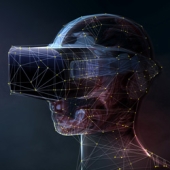Game on! Tech visionary says gaming offers lessons for attracting active users in the metaverse
IN BRIEF
- The primary way people will experience the metaverse in the short term will still be through 2D apps. The real metaverse, which will bridge the physical and digital realms using real-time 3D software, will probably take decades to become a reality.
- In immersive worlds, new technologies will siphon up data at an increasingly granular level, a person’s gait, eye movements, emotions and more, putting far greater strain on existing safeguards. Governments will need to pass new laws once a metaverse-shaped data economy comes into focus.
- To help bring the metaverse into their business models, companies have a key pathway: perfecting their end-users’ experience. They will want to focus on how their consumers expand their lives into virtual worlds and find the partners that can help them reach the audiences of the future. Collaboration between companies will be the quickest point of entry.
Edgar Perez is a business and technology visionary, speaker and author who helps executives better position their organizations for success through an approach that links disruptive technologies with business strategy. He is a Council Member of the Gerson Lehrman Group and Guidepoint Global Advisors, and fellow with the Ponemon Institute in Traverse City, Mich. Previously, Perez has held executive positions at Citigroup and IBM. Joe Kornik, VISION by Protiviti’s Editor-in-Chief, caught up with Perez to talk about the impact of a metaverse future. He says game makers have been able to attract large, active users and business leaders would be wise to monitor the sector to explore current trends, such as user-generated content becoming a bigger part of the overall immersive experience.
Kornik: I want start with a level-setting about the metaverse and its overall potential. I know you’ve called it the next evolution of the internet. Explain that in a bit more detail if you could.
Perez: Indeed, the metaverse will be the biggest opportunity for modern business since the creation of the internet. It’s the next evolution of digital platforms and the successor to yesterday’s desktop and today’s mobile internet. Now, the metaverse will not fundamentally replace the internet, but instead will build upon and iteratively transform it. The best analogy is the mobile internet, a “quasi-successor state” to the internet; even though the mobile internet did not change the underlying architecture of the internet, it led to changes in how users access the internet—where, when and why—as well as the devices they use. With the rise of digital commerce, the metaverse will unlock new opportunities for buyers and sellers to connect in a new way. You could imagine online shops becoming more immersive, with the option to buy physical or digital products. Today, people can attend online events; these can evolve into mixed-reality experiences where some people could join in person and others would buy a ticket for the virtual experience.
Kornik: It sounds like you’re bullish on its potential. From a global economic perspective, how big of a game changer will the metaverse be and when can we really expect its arrival?
Perez: The metaverse is a new iteration of the internet, one where people gather to communicate, collaborate and share with virtual presence through a personal avatar on any device. The metaverse will be an interoperable platform for immersive co-experiences, where a potentially unlimited number of people can come together within millions of 3D experiences to learn, work, play, create and socialize. This, in turn, will foster a rich community built on shared experiences, an engaging community where people form real connections. We are already seeing some glimmers of this future, but we know that the primary way people will experience the metaverse in the short-term will still be through 2D apps. The real metaverse, which will bridge the physical and digital realms using real-time 3D software, will probably take decades to become a reality.
Kornik: So, the big payoff is still far off, but several companies are already in the metaverse. What companies are already using it effectively and what lessons can be learned from these early adopters?
Perez: Certainly, gaming companies such as Roblox, Microsoft and Epic Games appear to be early leaders in the race for metaverse leadership. Game makers have been able to attract large, active users; these companies could seek to add additional social features and make user-generated content a larger part of their experiences. Business leaders would be wise to monitor these developments, establish internal teams that can understand the technology and its implications, and decide whether it makes sense to develop their own metaverses or partner with established platforms to test the waters.
Business leaders would be wise to monitor these developments, establish internal teams that can understand the technology and its implications, and decide whether it makes sense to develop their own metaverses or partner with established platforms to test the waters.
Kornik: For which industries do you see the most potential for success in the metaverse?
Perez: It’s difficult to predict which industries will have the most success in the metaverse. Aside from the gaming sector, I think areas like education could be impacted. The metaverse could be used for online learning and training, allowing students to interact with virtual environments and simulations in a more immersive way. Retail is another. Virtual shopping allows people to browse and purchase products from virtual stores and receive them in either the virtual or physical world. The metaverse will also revolutionize design and manufacturing processes all over the world using digital twin technology, a virtual representation of an object or system. By creating a virtual model that is an exact counterpart of a physical construct, companies can analyze and test different scenarios to understand not only how a product performs, but how it will perform in the future under different conditions. The continuous collection and processing of data provides an objective, data-driven design that can be used to accelerate digital transformation across a range of sectors.
Kornik: You mentioned retail and spending in the metaverse. I’ve heard you say bitcoin is dead, so what are your thoughts about crypto and other currencies that could drive commerce in the metaverse?
Perez: For years I have been predicting bitcoin’s collapse due to a number of reasons, including its lack of fundamental value, insufficient regulatory scrutiny, and consequent worsening of market sentiment. Now, usage of bitcoin, or any cryptocurrency for that matter, is immaterial to the success of the metaverse. While cryptocurrencies could be used to facilitate transactions within the metaverse, such as the purchase of virtual goods or services, and to verify the identity of users within the metaverse, helping to prevent fraud and ensure the integrity of transactions, there are a number of different approaches that can be employed as well. Many current metaverse operators employ their own virtual currencies, making them responsible for issuing and controlling the supply of such currencies. Ultimately, Central Bank Digital Currencies (CBDCs) could become dominant; think of digital versions of current fiat currencies in circulation today, such as the dollar, the euro or the renminbi. Many countries around the world have already deployed their digital currencies in the metaverse.
Kornik: How do you think we overcome some of the skepticism that’s out there around security and privacy and the metaverse?
Perez: It wasn’t long ago when users were balking at the prospect of entering their credit card information for online shopping; as of today, companies have established a number of mechanisms to protect our information from falling into the wrong hands. Certainly, the array of technologies that enable the metaverse, like VR, AR, 5G, and AI, all raise issues of privacy and data security. In immersive worlds, these new technologies will siphon up data at an increasingly granular level—a person’s gait, eye movements, emotions and more—putting far greater strain on existing safeguards. Along the same lines as the internet today, governments will need to pass new laws, or update guidance on existing statutes, once a metaverse-shaped data economy comes into focus.
Ultimately, Central Bank Digital Currencies could become dominant; think of digital versions of current fiat currencies in circulation today, such as the dollar, the euro or the renminbi. Many countries around the world have already deployed their digital currencies in the metaverse.
Kornik: Let’s talk about governments and regulation. Beijing has already said it plans to regulate “digital humans” in the metaverse. What do you see for the metaverse in terms of regulation and restrictions, and how could that impact business globally?
Perez: Like almost all user-facing applications in China, metaverse users are likely to be required to tie their digital personas to their real identity via the so-called real-name verification process. This is paving the way for China to build another digital landscape that will be different from the rest of the world in the ongoing global metaverse race. Conceptually, the metaverse will not be tied to any one platform in particular; experiences, possessions, identities and contacts will move unchanged across platforms in an extremely seamless way. That is a challenge most companies recognize today as an imperative; while that is certainly manageable when the jurisdictions involved follow common principles, the difficulties grow exponentially if jurisdictions diverge in their regulatory approaches, opening the door to a metaverse decoupling even before the concept is fully baked.
Kornik: How could business leaders prepare for a metaverse future? What advice would you offer them?
Perez: Once upon a time, the only way to stay up to date was reading newspapers, watching television or listening to the radio. The reality today is that people are spending more time online, giving rise to a new ecosystem of virtual living that encompasses digital possessions, relationships and social spaces. Therefore, brands will need to be a part of the digital third spaces that are pulling people’s time and attention, because people aren’t just working in digital spaces; they’re also socializing, shopping and discovering products there. To help bring the metaverse into their business models, companies have a key pathway: perfecting their end-users’ experience. They will want to focus on how their consumers expand their lives into virtual worlds and find the partners that can help them reach the audiences of the future. As the metaverse develops, collaboration between companies will not only be essential, but the quickest point of entry.






































